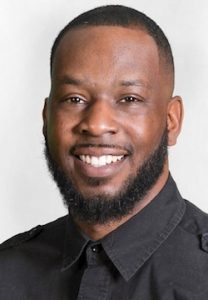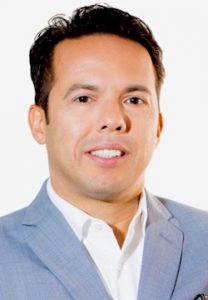Rev. Samuel Rodriguez, Diverse Leaders Dream of the Next Big Step for Racial Equality
If Washington launched a commission on race issues, what should it look like? Diverse faith leaders in charity, local activism and national advocacy answer.
As Americans mark the life and legacy of Dr. Martin Luther King, Jr., few deny that racial tensions have come to the forefront of society. A recent Pew Research study showed 58 percent of Americans believe racism is a “big problem” in the nation. That number has doubled just since 2011.
Reverend Samuel Rodriguez, a prominent Latino faith adviser to the White House, sees the issues more clearly than most. “We have not been this divided since the tensions of the 1960’s, when we were doing away with segregation laws,” he says.
He also proposes a step towards a solution. “It’s time for a national commission on racial reconciliation,” he urges. Other faith leaders are joining his call. They see tensions reaching a crisis point in the wake of violent protests in Charlottesville.
Jenny Yang leads advocacy efforts at World Relief. The faith-based group has served in over 100 nations. “Our sinful nature has perpetuated systemic policies and structures that have led to fissures in our society and the dehumanization of others,” says Yang. “I think that still continues today, in different forms.”
It’s not only voices on Capitol Hill who believe such a commission can do good. In 2014, Pastor Jonathan Tremaine Thomas moved his family to Ferguson, Missouri. His focus is what he calls civil righteousness. He contends seeking racial unity is acting on values expressed during America’s trying genesis.
“The beauty of humanity is its diversity,” says Thomas. “Any patriotic American should care about the issues and history surrounding race in our nation if they desire for us to fully embody the values that we espouse in our founding articles.”
Sacred Mission in an Uncertain World
The three faith leaders — Latino, Black and Asian-American — are quick to note believers carry a biblical mandate to be peacemakers.

Jonathan Tremaine Thomas
“I believe the church has not only an opportunity but a responsibility to lead the charge in binding up the brokenness of our nation,” says Thomas. He often serves as a mediator between “activist groups, community members, public servants and faith leaders” in Ferguson. The St. Louis suburb has been a flashpoint of racial tensions. Last fall, a court verdict sparked riots.
Rodriguez believes the commission will have “a very Christian premise,” he says. “It begins with the doctrine of Imago Dei. Every single American, without exception, in or out of the womb, carries the image of God. Therefore, we should treat each other with mutual love and respect — even when we disagree.”
The clash of perspectives may be inevitable in a polarized culture. “2017 has been a challenging year,” says Yang. She often speaks in churches across America for World Relief, particularly those ministering to immigrants. “There’s a palpable level of fear people have of being separated from their families.”
To illustrate, Yang recalls a recent trip to a church in Ridgecrest, North Carolina. “After I was done speaking about the Christian response to immigration, a group of women came up to talk. One told me, We love what you said. It’s interesting because a group of Hispanic leaders in our denomination were going to come. But they didn’t want to drive the hours in their van.”
The woman explained, “They were afraid they’d get pulled over on the long drive. They feared they would immediately be deported and have to leave their children behind. But they would’ve been encouraged by your talk.”
Yang views the church as a force for unity. “The government can’t do everything,” she says. “They should partner with churches in having these conversations and building trust. The two play complementary roles.”
Past Victories, Future Opportunities
Thomas sees recent history as a guide. “Between the 1970’s and mid-2000’s, over 35 commissions dedicated to truth and reconciliation were set up,” he says. “These were in Africa, Asia, Central and Latin America — even in Canada!”
“Of those, South Africa’s has been the most visible,” Thomas continues. “The U.S. shares similarities in the historic challenges that they sought to address. We can learn from, adapt and build upon components of their model. This initiative would work in partnership with educational and religious institutions, mental health groups, and state and local governments.”
Passed under Nelson Mandela’s leadership, the South African effort was chaired by Archbishop Desmond Tutu. The Truth and Reconciliation Commission concluded in 2003. It published a lengthy report detailing its discoveries and activities.

Rev. Samuel Rodriguez
A similar effort in the U.S. would face its own challenges. Rev. Samuel Rodriguez believes two figures could convene an authentically diverse, bipartisan group. “In my dream world, the co-chairs would be Bernice King, daughter of Dr. King, and Vice President Mike Pence,” he says. Bernice King serves as CEO of The King Center in Atlanta, Georgia and speaks often on her father’s legacy.
Knowing some would question his latter pick, he explains. “Vice President Pence took me aside one time. He said, Reverend Rodriguez, let me tell you who motivated me most in my journey other than Christ. It was Martin Luther King, Jr.”
“So our Vice President, this man from Indiana, this evangelical, began to explain to me the justice passion of Dr. King,” he says.
Rodriguez first offered his proposal to the Trump Administration last January. Now he isn’t sure whether the White House or Congress should issue the mandate. “The Executive Branch is extremely busy on multiple fronts,” he says. “Time is of the essence, so maybe a Congressional impetus behind this commission would serve in a more valid way because it’s coming from the people’s house. Congress is representative of the collective American body politic.”
“I believe the church has not only an opportunity but a responsibility to lead the charge in binding up the brokenness of our nation.”
He also cites Senators Tim Scott, Marco Rubio and James Lankford as leaders who “have a heart for racial reconciliation.” Whomever in Washington runs with the vision, emerging voices caution not to forget the next generation.
“A commission has to be intergenerational,” says Yang. “Many justice movements in our country have taken place at the community level by really young people who don’t have institutional ties.”
In the Interest of Justice
As to what policy issues the commission might address, the three leaders were unanimous on their top priority.
“The final institution that needs to experience a purging of all vestiges of racism is our criminal justice system,” says Rodriguez. “We cannot deny that young men of color face more severe criminal sentencing than those who are not of color. We know this as a matter of fact.” Recent bipartisan efforts nationwide have led to incarceration rates on the decline. Still, they say much work is yet to be done.
The Sacramento pastor ventures a bold claim. “If we address the criminal justice system, immediately I believe about 75 percent of race-related tensions would go away,” says Rodriguez.
“We need to do away with any sort of fear that exists in the African American and Latino communities regarding law enforcement,” he continues. “The intent is to establish dialogue between them and communities of color. It creates bridges.”

Jenny Yang
According to Pew Research, 79 percent of Americans believe bringing racially diverse people together to discuss these issues will help achieve equality. Yang also perceives a real need for open dialogue.
“A lot of people feel like they’re impacted by policy decisions,” she says. “But there’s no avenue for them to express their insecurities and fears to anyone within government.”
The leaders noted immigration reform as a secondary priority. “We learned something when President Trump brought together a bipartisan group of Congressional members,” she noted of the recent televised White House meeting. “It’s that we have a lot more in common around immigration than what divides us.”
Yang has faith that mutual respect can point the way to solutions. “Broad labeling of either side is not helpful,” she says. “About Republicans, I’ve heard people say, Oh, they’re heartless. They’re compassionless. I don’t think that’s true.”
What It Can Achieve
The prospect of such a commission animates these diverse leaders. From such a federal mandate, they see positive outcomes for the common good.
“First, there would be acknowledgement that there is tension,” says Rodriguez. “Second, there’d be a deliberate commitment to address the problems in an expedited manner. Third, it would move towards specifics. It could include legislative proposals and perhaps a national PSA campaign with messages of unity.”
“If we address the criminal justice system, immediately I believe about 75 percent of race-related tensions would go away.”
Yang advocates for a clear, actionable report. “Concrete ideas would be really effective,” she says. “We need recommendations anyone can read — a pastor, local leader or whomever. They should see themselves in it. They’d say, This is something I can do within my community or sphere of influence.”
Elevating voices of substance and moral clarity has potential to shift the national narrative around racial tensions, states Thomas.
“The intent is to bring unbiased, empirical evidence to support open dialogue and help facilitate truth-telling,” he says. “This is the clearest way forward that I see in terms of maturing the national conversation on racial justice with measurable and sustainable outcomes.”


